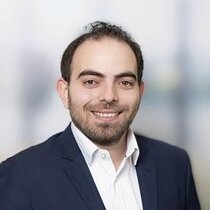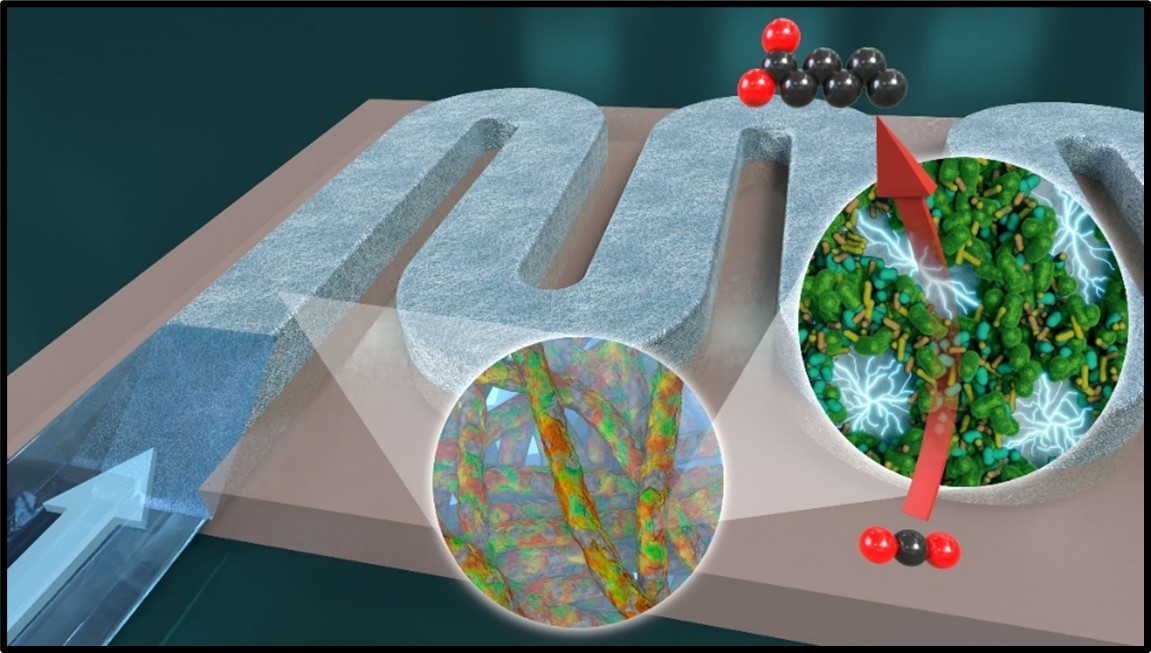Dr. Ludovic Jourdin | Delft University of Technology
Microbial Electrosynthesis from CO2 reaches Productivity of Syngas and Chain Elongation Fermentations
Microbial electrosynthesis (MES) allows the electrochemical upgrading of CO2. However, higher productivities and energy efficiencies are needed to reach a viability that can make the technology transformative. In this study we show how a biofilm-based microbial porous cathode in a directed flow-through electrochemical system can continuously reduce CO2 to even-chain C2-C6 carboxylic acids during 248 days. Robustness and stability of the biocatalysts are major advantages for industrial application. Our novel reactor mitigated mass transport limitations. We demonstrate a 3 fold higher biofilm concentration, volumetric current density, and productivity than the state of the art, up to a new record of 35 kA m-3cathode and 69 kgC m-3cathode day-1, at 60-97% and 30-35% faradaic and energy efficiencies, respectively. The highest butyric and hexanoic acids concentration ever reported in MES were achieved (17.4 g L-1 and 3.2 g L-1, respectively). Moreover, we identified the dominant microbial species responsible for the elongation of CO2 to C2-C6 carboxylates, namely Clostridium luticellarii and Eubacterium limosum. None of these species have been reported in MES to date and may represent the future ‘work-horses’ that push the boundaries of MES and possibly other gas fermentation technologies. Most notably, the volumetric productivity resembles those achieved in lab-scale and industrial syngas (CO-H2-CO2) fermentation and chain elongation fermentation. This study represents a milestone in developing MES as a competitive technology, marking a promising outcome that warrants further scaling-up of MES technology.
Oriol Cabau-Peinado,1 Marijn Winkelhorst,1 Rozanne Stroek,1 Roderick de Kat Angelino,1 Adrie J.J. Straathof,1 Kunal Masania,2 Jean Marc Daran,1 Ludovic Jourdin1,*
1Department of Biotechnology, Delft University of Technology, van der Maasweg 9, 2629 HZ Delft, the Netherlands
2Shaping Matter Lab, Faculty of Aerospace Engineering, Delft University of Technology, Kluyverweg 1, Delft 2629 HS, the Netherlands
Biography
After graduating as chemical engineer from the University of Montpellier (France), Ludovic Jourdin obtained his PhD in environmental biotechnology in 2015 from the University of Queensland (Australia), during which he investigated novel technologies for electricity-driven bioconversions. He then completed a 3-year postdoctoral position at Wageningen University, where his main focus revolved around the electricity-driven bioproduction of valuable chemicals from wastes such as carbon dioxide and organic waste streams. In October 2018, he started his independent career as assistant professor at Delft University of Technology and was promoted to associate professor in October 2023. His group is interested in microbial electrochemical conversions that are relevant to nowadays’ global and societal challenges.

